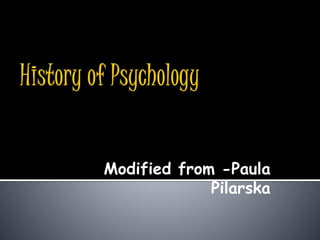
History ppt
- 1. Modified from -Paula Pilarska
- 2. The scientific study of human and animal behavior
- 3. Pretty much ANYTHING that you do, think or feel.
- 4. Research: Studies why things happen. Deals with theories and lab experiments ▪ “Lab tests show people’s anxiety level increases when surrounded by the color red.” Applied: Figures out how to USE information found by researchers “NASA scientists study which colors to paint the inside of the International Space Station”
- 5. Separated from philosophy in the middle of 19th century with roots in biology Psychology" comes from the Greek words: "psyche" meaning mind or soul, and "logos", meaning reason. Reasoning about soul – philosophy of the mind
- 6. Starting in the 1840’s fought for humane treatment of people with psychological disorders, in the US Dorothea Dix 1802-1887 Holding Chair
- 7. – Not a psychologist – Developed theory of evolution – Believed we can study animals to understand ourselves – Explained animal diversity as evolutionary process: “natural selection” Charles Darwin (1809-1882)
- 8. – Germany 1880’s – The “father of psychology” – Founder of modern psychology – Opened the first psychology lab in 1879 – applied laboratory techniques to study of the mind – was using scientific research methods to investigate reaction times – use the process known as introspection Wilhelm Wundt (1832–1920)
- 10. American graduate student of WilhemWundt Established first formal US psych lab at Johns Hopkins University G. Stanley Hall 1844-1924
- 11. the founder was Edward B. Titchener the first school of psychology focused on breaking down mental processes to understand the “structure” of the mind researchers were using a method known as “introspection” (people reported on their experiences in experiments) there were flaws in reports and required subjects with good communication and intellect faded away with introspection influenced experimental psychology Edward B. Titchener (1867-1923)
- 12. 1880’s-1900’s formed as a reaction to the structuralism and was heavily influenced by the work of William James and the evolutionary theory of Charles Darwin focused on the function of consciousness emphasized individual differences, which had a profound impact on education William James (First American Psychologist) 1842 - 1910
- 13. Denied admission to Harvard William James let her take his classes anyway and she passed all exams Harvard denied her Ph.D. Became a memory researcher and first female president of APA Mary Whiton Calkins 1863-1930
- 14. First woman to earn psychology Ph.D. Second female APA president Margaret Floy Washburn 1871-1939
- 15. Austrian late 1800s – 1930s Physician that focused on illness Founder of the psychoanalytic perspective Developed the Use of "Talk Therapy" Believed that abnormal behavior originated from unconscious drives and conflicts Psychoanalysts believe that childhood events and unconscious feelings, thoughts and motivations play a role in mental illness and maladaptive behaviors. Sigmund Freud (1856-1939)
- 16. Personality is composed of three elements: ID - includes the instinctive and primitive behaviors, id is driven by the pleasure principle EGO - is responsible for dealing with reality, and is driven by the reality principle, which strives to satisfy the id's desires in realistic and socially appropriate ways SUPEREGO - holds all of our internalized moral standards that we acquire from both parents and society - our sense of right and wrong
- 17. Behaviorist Russian Physiologist early 1900s Pavlov's research on the digestive systems of dogs led to his discovery of the classical conditioning process, which demonstrated that behaviors could be learned via conditioned associations. Emphasized the study of observable behaviors Ivan Pavlov, 1849 –1936
- 19. • Founder of Behaviorism • Studied only observable and objectively described acts • Emphasized objective and scientific methodology • Believed consciousness was irrelevant to ppsychology John B. Watson (1878–1958)
- 20. Before: “Oh, look! What a sweet fuzzy doggie.” After: “Aaah! Get this horrible, fuzzy bunny away from me!
- 21. Studied children's’ thinking Observed and questioned them Created a theory of human cognitive development Jean Piaget 1896-1980
- 22. American -Mid – late 1900s Behaviorist, famous for his research on operant conditioning Focused on learning through rewards and observation studied learning and effect of reinforcement "The consequences of behavior determine the probability that the behavior will occur again" --B. F. Skinner B. F. Skinner (1904–1990)
- 24. felt that both psychoanalysis and behaviorism were too pessimistic emphasized the importance of self-actualization, which is a process of growing and developing as a person to achieve individual potential healthy persons strive to reach his / her own potential stressed the study of conscious experience and an individual’s free will Founders Carl Rogers 1902 – 1987 Abraham Maslow 1908 – 1970
- 25. This hierarchy suggests that people are motivated to fulfill basic needs before moving on to other needs.
- 26. Gestalt – German, means a “form” or a “whole” the whole is greater than the sum of the individual parts Integrate pieces of information into meaningful wholes Principles about how information is organized
- 27. Georges-Pierre Seurat “Sunday Afternoon on the Island of Grande Jatte” 1884-85
- 28. What do you think?
- 29. Nature vs. Nurture Something occurred in life to make you that way OR You came out of the womb that way